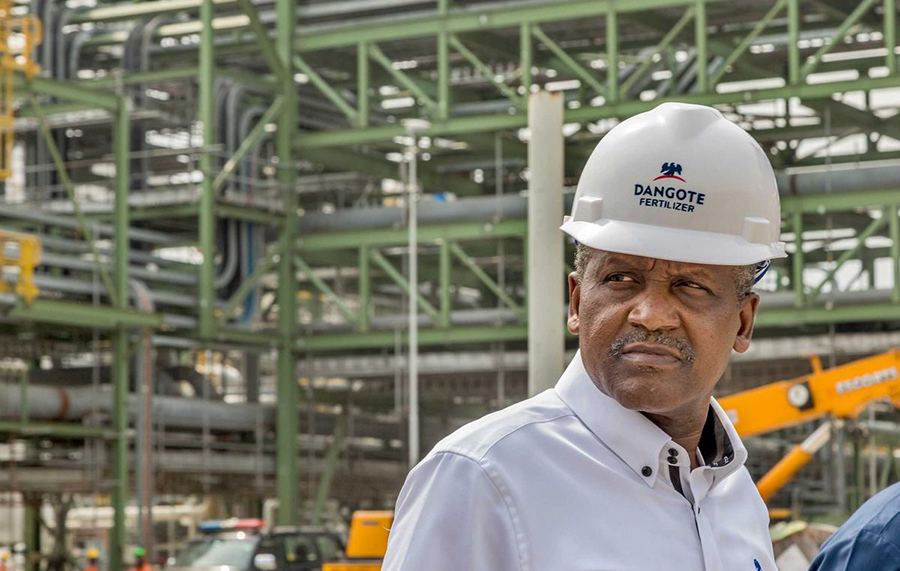Article summary
- The Dangote refinery will help develop local industries in Nigeria.
- The refinery’s production of critical products like naphtha and polypropylene will stimulate the development of other industries, such as cosmetics, plastics, and textiles.
- The high volume of petrol output from the refinery would transform Nigeria from a petrol import-dependent country to an exporter of refined petroleum products.
Alhaji Aliko Dangote has said that his 650,000 barrels per day refinery will activate local industries for the production of textiles, plastics, and cosmetics.
ThisDay reports that the businessman recently conducted an interview with The Economist Magazine, ‘The World Ahead 2023, where he spoke about the potential of the refinery, which is scheduled for commissioning on May 22, 2023. Dangote said:
- “The refinery’s completion will not only create direct and indirect jobs but also lead to skills transfer and technology acquisition opportunities that will benefit the downstream sector. Moreover, the refinery’s production of critical products like naphtha and polypropylene will stimulate the development of other industries, such as cosmetics, plastics, and textiles.
- “We see room for the development of added value in agribusiness too. Here, initiatives like our Sugar Backward Integration Projects look to create a strong localized supply in the sugar industry. With a goal to produce around 0.5 million tons of sugar per year from locally grown sugar cane, benefits will be created across the sugar value chain for local suppliers,”
According to Dangote, Nigeria has a variety of untapped natural resources that, for commodity-driven investors, offer options in the upstream, midstream, and downstream segments.
Also, Dangote believes that Nigeria’s import dependency and reliance on foreign markets present major prospects for import substitution and supply chain localisation. He stated that across various consumer-goods sectors of the economy, as well as supply-side needs for commercial and industrial enterprises, there are different options to set up localised supply networks.
Previous confirmation
In October 2022, Nairametrics reported that the Group Executive Director, Strategy, Portfolio Development, and Capital Projects, Dangote Industries Limited, Mr. Devakumar Edwin, said the Dangote refinery would stimulate economic development in Nigeria because it could meet 100% of the Nigerian requirement for all liquid products.
These products include gasoline, diesel, polypropylene, kerosene, and aviation jet fuel. He also said the refinery can provide a surplus of each of these products for export. Edwin had said:
- “The high volume of petrol output from the refinery would transform Nigeria from a petrol import-dependent country to an exporter of refined petroleum products.”
What you should know
In June 2022, investment management firm, Chapel Hill Denham released a report that said the Dangote refinery could help Nigeria fix its oil sector crises. The report stated:
- “We believe change is imminent, with the Dangote Refinery looking set to begin operation towards the twilight of 2023. If fully utilized, we believe the refinery can redefine Nigeria’s domestic production of white products (petrol, Automotive Gasoline Oil, AGO and Dual-Purpose Kerosene, DPK). and potentially turn the country into a net exporter.”















😂😂😂 Nigerian leaders, mostly from the North, prefer to save their loot in Dangote businesses becuz they have no clue to run business or grow Nigerian economy. What happens to the 3 refineries owned by the Nigerian public? Any day you govern and exclude the ordinary people, you have set a time bomb
@Commando, Aliko Dangote is one of the few shining lights from Nigeria and only those Nigerians who celebrate failure and denigrate success fail to grasp this reality.
If Mr. Dangote was interested in “saving loot” as do RENT-SEEKING Nigerians (which btw is not just limited to leaders), he would have stashed his wealth abroad instead of investing in MANUFACTURING (rather than trading) throughout Nigeria (and not just in his state or local govt, as with most Nigerians) – creating TENS OF THOUSANDS OF JOBS IN NIGERIA FOR NIGERIANS, not only directly but indirectly along the entire value chain! Not to mention the wealth and revenue generated from corporate and individual income taxes for the government (if not looted by the politicians) to ploughing into education, healthcare, public transportation and infrastructure. That is how to develop a nation’s economy, instead of what most Nigerians think that Nigeria could be adequately developed by simply SHARING crude oil revenues generated mostly by foreign IOCs.
Finally, not sure what you are going on about so-called “3 refineries owned by the Nigerian public” (as if any of us have ever received dividends from those refineries), but even at full installed capacity those refineries will not satisfy demand for products in Nigeria. More importantly, Nigerians should NOT be effectively subsidizing the gross ineptitude and inefficiency of the government-owned refineries. Let those 3 refineries compete in the market (including price competition) with the new private refineries coming on board (Waltersmith, Dangote, BUA, etc). Excess production, after meeting Nigerian domestic demand, can thereafter be EXPORTED throughout the ECOWAS (where crooked Nigerian CITIZENS are currently smuggling imported fuel that is subsidized by the Nigerian taxpayer) and even broader African market.